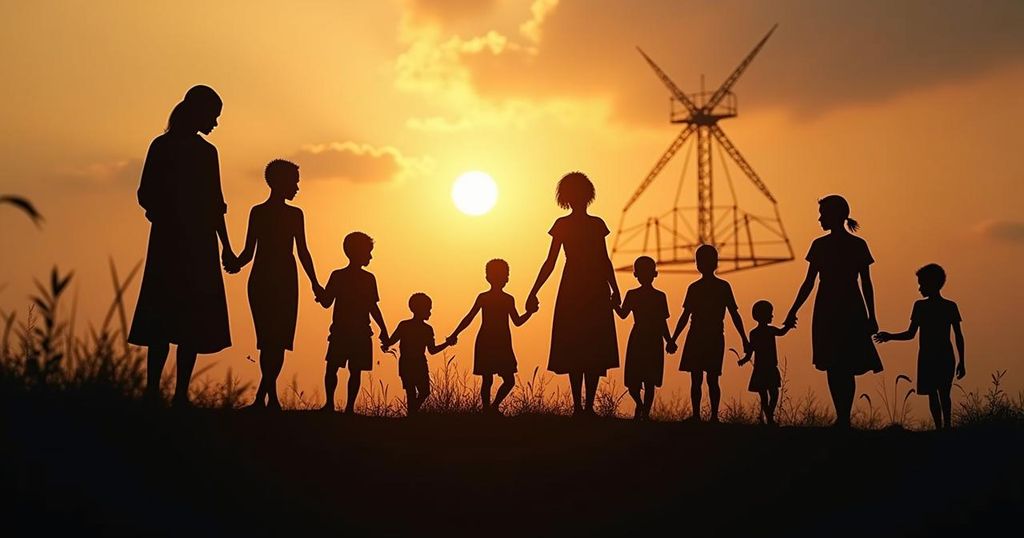Nearly One Million Displaced in DR Congo This Year, Warns UN
The UN human rights chief, Volker Turk, reported on October 8, 2024, that nearly one million individuals have been displaced in the Democratic Republic of Congo this year, amidst escalating violence and rampant human rights violations. With the reinstatement of the death penalty and over 23 million people facing food insecurity, Turk highlighted the urgent humanitarian crisis that endangers millions of lives in the DRC.
On October 8, 2024, in a dire report from Geneva, Switzerland, the United Nations human rights chief Volker Turk announced that nearly one million individuals have been forcibly displaced from their homes in the Democratic Republic of Congo (DRC) this year alone. The chief expressed deep concern regarding the worsening conditions in the country, highlighting the rising number of individuals on death row following the recent lifting of a long-standing moratorium on the death penalty. He described the DRC as suffering from an “explosive mix of escalating violence, regional and international interests, exploitative corporations, and weak rule of law.” According to Turk, 85 percent of reported human rights violations occurred in the eastern conflict-affected regions, where armed groups were responsible for 61 percent of these abuses. A particularly troubling statistic indicated that approximately 700 new cases of sexual violence have been documented, with many women and girls subjected not only to abduction but also to horrific acts of sexual slavery. He emphasized that this violence often goes unreported, stating, “All cases are certainly not being reported. This is atrocious.” The UN report highlighted a total of more than 6.4 million internally displaced individuals in the DRC, with an additional 940,000 people displaced this year alone. Furthermore, an alarming 23.4 million residents face food insecurity, lacking regular access to safe and nutritious meals. Turk criticized the DRC’s recent decision to reinstate the death penalty, which he labeled as a “major step backward,” noting that since March 128 men have been condemned by military courts, with a strong appeal for the authorities to refrain from carrying out these sentences. Amidst the backdrop of the country being rich in natural resources, Turk pointed out the detrimental impact of their illegal exploitation, stating that this was a catalyst for the ongoing violence and economic impoverishment affecting the population. He outlined the complicity of corporations in this exploitation while asserting, “The DRC is one of the five poorest nations in the world… this situation is unacceptable.” Mentioning global consumers, Turk warned that everyday products like mobile phones contain minerals sourced from conflict-ridden eastern DRC, further exacerbating local suffering. As the DRC vies for a seat on the UN Human Rights Council, Turk’s grim assessment underlines the urgent need for international attention and action in addressing these escalating human rights crises.
The Democratic Republic of Congo has a long-standing history of conflict and instability, negatively impacting its population’s human rights and socioeconomic conditions. With mineral wealth and significant natural resources, the country ironically remains one of the poorest globally due to systemic exploitation and conflict-related violence. The United Nations consistently monitors and reports on the humanitarian crises in the DRC, drawing attention to the rising numbers of internally displaced persons, food insecurity, and widespread human rights abuses, particularly in the eastern regions controlled by various armed groups.
In conclusion, the reports from the United Nations regarding the Democratic Republic of Congo reveal an alarming humanitarian crisis characterized by widespread violence, serious human rights violations, and significant levels of internal displacement and food insecurity. The lifting of the moratorium on the death penalty raises further concerns about the rule of law and human rights protections. As the DRC enters a critical election for a seat on the UN Human Rights Council, it is imperative that the international community remains vigilant and proactive in addressing the ongoing challenges faced by millions in this resource-rich yet impoverished nation.
Original Source: www.jamaicaobserver.com




Post Comment